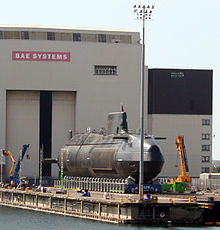Our website is made possible by displaying online advertisements to our visitors.
Please consider supporting us by disabling your ad blocker.
Nuclear submarine
| Nuclear submarine | |
|---|---|
 British Astute-class submarine | |
| Classification | Watercraft |
| Industry | Arms |
| Application | Underwater warfare |
| Invented | 1955[1] |
A nuclear submarine is a submarine powered by a nuclear reactor, but not necessarily nuclear-armed. In the US classification, nuclear-powered submarines are designated as SSxN, where the SS denotes submarine, x=G means that the submarine is equipped with guided missiles (usually cruise missiles), x=B means that the submarine is equipped with ballistic missiles (usually intercontinental) and the N means that the submarine is nuclear-powered. SSN refers to nuclear-powered attack submarines, which do not carry missiles.
Nuclear submarines have considerable performance advantages over "conventional" (typically diesel-electric) submarines. Nuclear propulsion, being completely independent of air, frees the submarine from the need to surface frequently, as is necessary for conventional submarines. The large amount of power generated by a nuclear reactor allows nuclear submarines to operate at high speed for long periods, and the long interval between refuelings grants a virtually unlimited range, making the only limits on voyage times factors such as the need to restock food or other consumables.[2] Thus nuclear propulsion solves the problem of limited mission duration that all electric (battery or fuel cell powered) submarines face.
The high cost of nuclear technology means that relatively few of the world's military powers have fielded nuclear submarines. Radiation incidents have occurred within the Soviet submarines, including serious nuclear and radiation accidents, but American naval reactors starting with the S1W and iterations of designs have operated without incident since USS Nautilus (SSN-571) launched in 1954.[3][4]
- ^ Delgado (2011), p. 200.
- ^ Trakimavičius, Lukas. "The Future Role of Nuclear Propulsion in the Military" (PDF). NATO Energy Security Centre of Excellence. Retrieved 15 October 2021.
- ^ Cite error: The named reference
johnston2007was invoked but never defined (see the help page).
Previous Page Next Page


